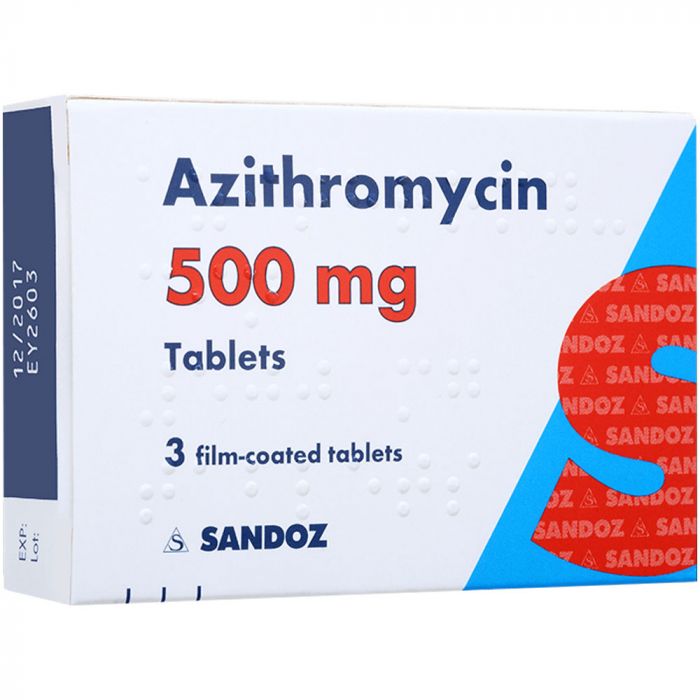Azithromycin
Buy Azithromycin to treat Chlamydia online
Please note brand received may vary
sourced in the UK
order before 2pm
UK based pharmacies
-
What is Azithromycin?
Azithromycin is an antibiotic that is prescribed to treat a variety of bacterial infections. It can be taken by adults and children for different conditions.
It is one of the most commonly prescribed medicines for the treatment of chlamydia. However, Azithromycin can also be prescribed for the likes of chest infections and Lyme disease.
You need a prescription to buy Azithromycin.
What is Azithromycin used to treat?
Azithromycin is a broad-spectrum antibiotic, meaning it can be prescribed to treat a number of different conditions caused by bacteria.
This medication is a common treatment for the sexually transmitted infection (STI) chlamydia.
Other conditions Azithromycin can be used to treat include:
- Lyme disease
- Sinus infections
- Skin infections
- Chest infections like pneumonia
- Nose and throat infections
Azithromycin can be prescribed for children to treat infections of the ear or chest.
Why is Azithromycin prescribed to treat chlamydia?
Clinical studies showed that Azithromycin is more than 95% effective at treating chlamydia if taken properly.
How does Azithromycin treat chlamydia?
Azithromycin belongs to a group of medicines called macrolide antibiotics.
This type of antibiotic works to treat infections by stopping the bacteria that causes them from reproducing. This means that the bacteria cannot spread, so your immune system is able to fight the infection effectively.
Who can take Azithromycin?
Azithromycin is safe for both adults and children, but it is not suitable for everyone to take.
Speak to your doctor before taking this medication if:
- You have any liver or kidney problems
- You have had diarrhoea while taking other antibiotics in the past
- You have heart problems, including an irregular heartbeat
- You have had an allergic reaction to Azithromycin or any other medication in the past
- You have diabetes
- You have myasthenia gravis (Azithromycin can make this illness's symptoms worse)
- You have low blood levels of potassium or magnesium
Women who are pregnant or breastfeeding may be prescribed a different medication. Tell your doctor if you are pregnant, trying to get pregnant or are breastfeeding.
This list is not exhaustive. The patient information leaflet will provide a full list of reasons why Azithromycin may not be suitable for you.
Can you buy Azithromycin over the counter?
Azithromycin is only available to purchase on prescription, so cannot be bought over the counter.
Can you buy Azithromycin online in the UK?
Yes, you can buy Azithromycin online in the UK from Medicine Direct. This medicine is prescription-only, so before your order is approved, you will first need to complete a confidential online consultation. Your answers will be reviewed by one of our doctors, pharmacists or prescribers, who will assess your condition to make sure that Azithromycin is a suitable treatment.
Order by 2pm and we can offer you next day delivery of your medicine.
For your safety, you should not order any type of medicine online unless it is from a regulated pharmacy, like Medicine Direct. Full details of the medical authorities that regulate our pharmacy can be seen on the About Us page.
Azithromycin alternatives
Doxycycline is the most common alternative to Azithromycin when it comes to chlamydia treatment. It is the primary treatment for this infection.
Doxycycline is a one-week course of treatment for chlamydia and is also a prescription-only medicine (POM).
-
Azithromycin dose for chlamydia
The normal dose for Azithromycin to treat chlamydia is two or four 500mg tablets as a single dose.
Please see the patient information leaflet for complete details on dosage before you start to take Azithromycin.
Always take Azithromycin in the dose prescribed by your doctor.
How to take Azithromycin
Take Azithromycin as soon as possible after testing positive for chlamydia.
Swallow Azithromycin tablets whole with a drink of water. Do not crush or chew the tablets.
You should take a chlamydia test two weeks after your treatment is over. This will make sure that your infection has cleared. Do not have sexual intercourse until you know that the infection is gone.
Consult the patient information leaflet for full instructions before you start to take this medication. Speak to your doctor or pharmacist if you are still unsure of how to take it.
-
Side Effects
Like all medications, Azithromycin tablets come with the risk of certain side effects, although not everyone will suffer from them.
The common side effects of Azithromycin affect more than 1 in every 100 people who take it and include:
- Headaches
- Feeling dizzy
- Feeling tired
- Feeling sick
- Vomiting and/or diarrhoea
- Loss of appetite
- Changes to your sense of taste
Seek medical attention if any of these reactions bother you or do not go away.
Refer to the patient information leaflet for comprehensive details on why this medicine may not be suitable for you.
-
Azithromycin Warnings and Drug Interactions
Azithromycin can interact with other medications. It is important you tell your doctor or pharmacist if you are taking any prescription or non-prescription medicines.
It is important to follow your doctor's dose instructions. Even if your symptoms subside, you must complete your full course.
Not completing your course may result in the infection still being present. Chlamydia can cause complications when not treated.
Pregnancy and breastfeeding
Taking azithromycin during pregnancy is considered to be safe and does not pose a risk to the unborn baby.
However, having chlamydia during pregnancy is an infection risk to both the mother and baby. Therefore, it is important to ensure your doctor is aware that you are pregnant to ensure the correct treatment is prescribed.
We recommend BUMPS for additional information on taking azithromycin during pregnancy and breastfeeding.
Please note, these lists may not be exhaustive. Please refer to the patient information leaflet for comprehensive details on why this medicine may not be suitable for you.
-
Ingredients
The main active ingredient within this medicine is: Azithromycin dehydrate
For a full list of the inactive ingredients, please read the Summary of Product Characteristics.
-
How much does it cost to buy Azithromycin online in the UK?
Dosage Quantity Price Azithromycin 500mg 2 Tablets £14.99 -
How long does Azithromycin take to treat Chlamydia?
Most infections will be cleared up within a few days of treatment. For the most effective treatment with Azithromycin, it is vital that you take it exactly as your doctor has told you. Do not stop your course of treatment before your doctor tells you.Can azithromycin treat any other STIs?
Azithromycin can be used for chlamydia and is also prescribed as a dual therapy treatment for gonorrhoea. When used as a gonorrhoea treatment, it is normally prescribed with Cefixime, which is another antibiotic.Is it okay to drink alcohol while taking Azithromycin?
Drinking moderate amounts of alcohol will not interact with Azithromycin.Can I have sex during my treatment?
If you are treating a sexually transmitted infection with Azithromycin, you should not have sex until you know that your infection has cleared. You should do another test after two weeks to make sure that your infection has gone.Which antibiotic is the best for treating chlamydia?
Doxycycline is the first-line treatment option for Chlamydia. Azithromycin will typically only be prescribed if Doxycycline is ineffective or cannot be taken.How will I know when my chlamydia has been treated?
You should start to notice your symptoms going away within a few days of treatment ending. However, to make certain that Azithromycin has effectively treated your chlamydia, you should take another test after treatment.What will happen if I don’t get chlamydia treated?
Left untreated, chlamydia can spread to other parts of the body. This can cause complications such as pelvic inflammatory disease in women. This can lead to infertility, tubal pregnancies, and chronic pelvic pain. In some cases, chlamydia can cause reactive arthritis.Will Azithromycin affect my fertility?
No evidence exists to firmly suggest that this medicine will reduce male or female fertility. However, if you are trying to get pregnant, you should tell your doctor or pharmacist before you take Azithromycin.Can I catch chlamydia again?
Yes, you can catch chlamydia again if you come into contact with it through your sexual partner. Azithromycin does not offer any immunity to catching chlamydia again.When can I have sex again?
After your treatment, you should take another chlamydia test to ensure the treatment has worked. You should only have sex when you have tested negative for chlamydia.Does Azithromycin treat Chlamydia in both men and women?
Azithromycin can be used by both men and women to treat chlamydia.Does Azithromycin cure chlamydia?
Whilst azithromycin can clear a chlamydia infection it will not cure or prevent you from ever catching the infection again.Can chlamydia be resistant to Azithromycin?
There is a growing concern that Azithromycin is facing more resistance from chlamydia when trying to treat it. It is believed that Doxycycline is more effective at treating chlamydia and some of its complications which is why is it now the first-line treatment option.
Written by: Sonia Khan MPharm: 2076091
Updated on: 31/08/2021
This content has been written by Hussain Abdeh and has been medically reviewed by Sonia Khan
Hussain Abdeh
MPharm: 2211840
UK registered pharmacist
How it works - get your medicine in 3 simple steps
- 1 Choose your treatment Select the treatment or medication you need and answer a few questions online regarding your condition.
- 2 Online consultation A UK based doctor registered with the GMC will review your questions and assess your suitability for the medication.
- 3 Receive your delivery If approved, your medication will be dispensed from a UK based pharmacy.








